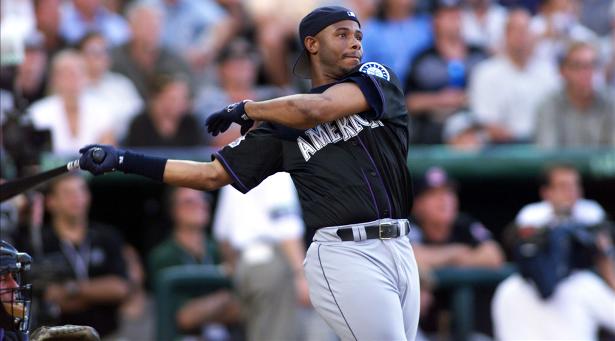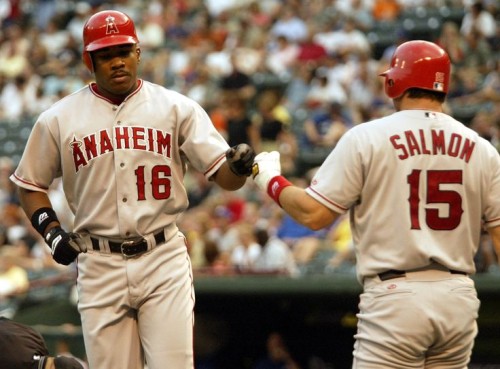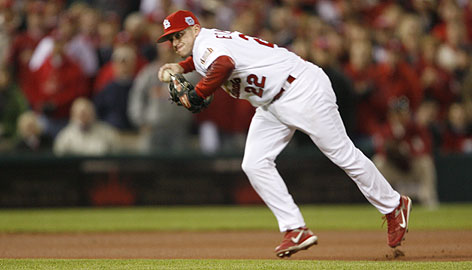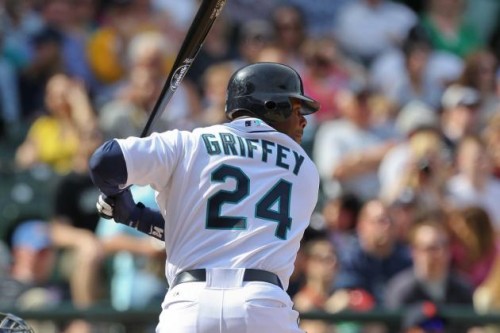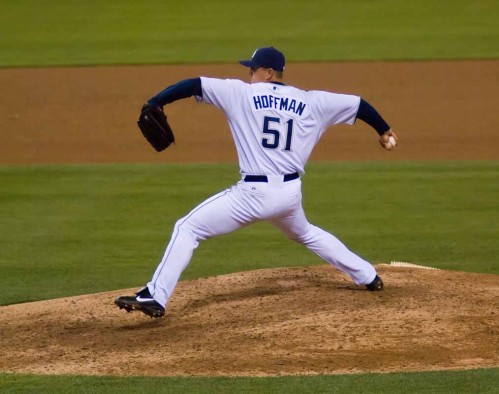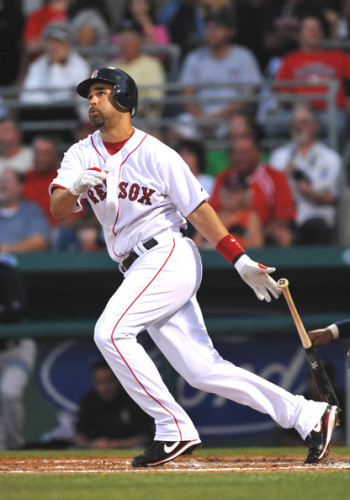My analysis of the Hall of Fame voting continues here, with the Newcomers. (You can read Part One of my breakdown here.) These are players who have been selected to join the Hall of Fame ballot for the first time. The rules are as follows:
- You must have played in Major League Baseball for at least 10 years.
- You must have been retired for five years.
- You cannot be on baseball’s ineligible rolls (See: Rose, Peter)
Those relatively loose rules mean that multiple players of varying quality can join the ballot. For every newcomer such as Randy Johnson, there’s a Jacque Jones. For every Pedro, a Tom Gordon. For every Smoltz, a Delgado. It’s an eclectic mix, and one that’s always a crapshoot as to who will actually receive votes. Who sticks around is a separate matter, but we’ll get into that.
Last year, nine newcomers received votes. Three were elected on their first ballots (Messrs. Johnson, Pedro, and Smoltz). One stuck around (No-Mah). The other five either received a fair chunk of votes (well, one guy did – Carlos Delgado) or received some odd sympathy votes from writers who followed them for years. At least, that’s the only way I can fathom why 4 people voted for Troy Percival.
This year brings another interesting batch, with at least one player getting elected on his first go round, one player getting close, and one likely to linger down-ballot for at least one year. So, let’s take a look.
NOTE: I’ll be breaking this down into three chunks. The first part will deal with the Holdovers – those who have remained on the ballot from last year after gaining at least 5% of the vote. The second will deal with the Newcomers – those who have been selected to populate the ballot after having played for at least ten years in MLB and having been retired for five years. The last will bring about my predictions for the final ballot, with some guesses as to what trends we will see.
In these columns, I’m not going to be making a detailed statistical analysis of each player. Rather, I’ll be studying voting trends and estimating why players are going to be voted on or not voted on, as well as what trends are likely to reveal themselves this year. I’m much more of a voting stats junkie than an in-game stats junkie, and voting trends have proven themselves to be infinitely more fascinating to me over the years I’ve done this series. It’s going to be an interesting year.
Numbers are current as of 12/20/2015.
GARRETT ANDERSON
Garrett Anderson was a player who benefited from playing in the center of that high-production Angels offense of the early part of the decade. He was a high-average, low-OBP player with decent gap power (lots of doubles!) who could be counted on to drive in 80 to 120 runs every year. He was another cog that made the 2002 World Champions go, and if there’s something that past ballots have revealed, it’s that some voters clearly have a fond memory of that team. Last year, Troy Percival (the team’s closer) and Darin Erstad (the team’s center fielder) received votes. Tim Salmon’s appeared on the ballot before as well, and two more players from the team make appearances here. Call it the LA Market. Call it defeating Barry Bonds in the playoffs, depriving him of a World Series ring.
Whatever the cause, he’s likely to get a vote or three. But that’ll be it – he simply wasn’t that good of a player to get more than one or three votes. If he does, it’ll be an Angel-ic miracle. Verdict: 1-2 votes
(Note: He already did! The Angels theory holds true!)
BRAD AUSMUS
Ausmus was a great defensive catcher who had the power of a Squib from the Harry Potter series. Among position players, he has the lowest OPS of any player on the ballot. When your OPS is lower than that of David Eckstein, you know that you’re contributing to the team with intangibles such as leadership. In Ausmus’s case, he definitely provided the leadership for that 2004/2005 playoff team featuring Jeff Bagwell, Craig Biggio, Lance Berkman, and Jeff Kent, helping to propel them into the World Series, where they ultimately lost to the 2005 White Sox. (Another team we’ll start seeing players from in a couple of years, with players likely to receive one or two votes from Chicago market writers. I’m just calling it like I see it.)
Anyway, Ausmus had a fine career, and transitioned his leadership skills into a position as the current Tigers manager who is perpetually on the Hot Seat. So that’s a thing. Either way, he had a great career, but not one likely to receive a single Hall of Fame vote. Verdict: No Votes
LUIS CASTILLO
Here we find a really good player who is primarily remembered for gaffes committed as a New York Met. Luis twice led the league in stolen bases, retiring with 370 total thefts. He never hit for much power in any respect, but he knew how to draw a walk, making him a decently valued 2nd baseman. He was one of the two engines that made the 2003 Marlins machine go, along with Juan Pierre. His was a good career, but not a Hall of Fame career. And let’s be real, nobody is looking back fondly at that Marlins team just yet and saying “Yes, those guys did it right!”
At least, not until Miguel Cabrera retires. Verdict: No Votes
DAVID ECKSTEIN
This guy is why the Hall of Fame voting is a fun process. David Eckstein is clearly not a Hall of Fame player. He retired with low overall numbers. His WAR of 20.8 would be a sizable low for any shortstop in the Hall. His defense was questionable at best. And yet, because he’s on the Hall of Fame ballot, schmucks like me get to look back and give him his moment in the sun. Because all in all, Eckstein had a career most players can only dream of.
Diminutive and untalented, Eckstein got along with grit, hustle, and determination. He worked hard for every hit. When walked, he always sprinted to first base. He had no choice – if he didn’t, that would be that. There is no place in the majors for the untalented. Eckstein was the exception to that rule. He won two World Series rings, one with the Angels, and another in 2006 with the Cardinals. He was even the MVP of that Series! Most players would kill to have this kind of career.
It was a good career. But not a Hall of Fame career. Verdict: No votes
JIM EDMONDS
Edmonds falls into the Kenny Lofton/Steve Finley category of players who need a bit more examination. His numbers pale a bit in comparison to the other notable center fielder on this ballot, but are solid overall, if not quite Hall of Fame worthy. He played sterling defense at a position that demanded defensive excellence. He hit for a ton, and was a key player on the great Cardinals team of the 2000’s. However, he missed a few key round numbers that might attract some voters to his cause – 51 hits short of 2000, 7 home runs short of 400, 1 RBI short of 1200, 2 walks short of 1000, etc. Meanwhile, his WAR was not quite average for the Hall of Fame, with his 57.2 falling about 10 points short of the standard.
If any player gets multiple votes on the same scale as a Carlos Delgado (more than 1%, less than 5%), it’ll be Edmonds. I do think that he’s falling off the ballot, though. There’s just not enough here to merit an extended discussion. Verdict: 2.5% and Off the Ballot
TROY GLAUS
The third Angel from that 2002 team, and the only other one likely to receive votes in this election – he was the MVP of the 2002 World Series, and if that team is attracting love, he’ll get some kind of love for that, I’m sure. Glaus was a legitimate power threat in the early stage of his career, and proved to be one in later years, having a particularly good season for Toronto in later years. However, PED allegations did come to light against Glaus in the 2007 Mitchell Report. (That might be the reason he gets no votes while Anderson gets 1.) His WAR was low for the time, even as his home runs spiked during the peak of the Steroid Era (twice hitting 40+ home runs), and so he’s not getting as many votes as a player like Jum Edmonds might receive. Verdict: 1 vote or fewer
KEN GRIFFEY JR
Spoiler Alert – Ken Griffey Jr. will be elected to the Hall of Fame this year.
Currently polling at 100% with 72 ballots received, it’s not a question of if Junior is getting in, but of how high his percentage will be. There’s a very real chance that the Kid, the most universally beloved player of his time, could break Tom Seaver’s record for percentage – 99% is a definite possibility. Getting in unanimously won’t happen – some writers just don’t believe in letting a player in without some stipulations, even for an all-time great like Junior.
To be fair, there are “arguments” for not voting for Junior – important to note: they’re bullshit arguments. Much of his value was accumulated during the first 10 years of his career, when Griffey was on pace to shatter Hank Aaron’s home run record. (Oh, those were simpler times, innocent times.) After his 2000 trade to Cincinnati, he had one great year before injuries took their toll and decimated any chance he had of breaking that record. Even so, he still retired with 630 home runs, a total topped by only five other players. (Two of whom are noted PED users.) I still remember watching as Griffey hit his 500th career home run on Father’s Day, as special a moment as any in Reds history. It’s a shame that his career was so marred – if you think his numbers are good now, think of what they might have been had he stayed healthy in his 30’s.
Oh, and the only PED Griffey was ever connected to was that goop that Mr. Burns pushed on him to try and win the softball league tournament. And we all know how that turned out.
To recap, Griffey is getting in – anyone not voting for Junior had better have a really good reason not to, or they might as well not reveal their ballots publicly. Verdict: 98.5% total votes
MARK GRUDZIELANEK
I had to look up this guy’s name to make sure that I spelled it right. I recall him bouncing around for several years, and mostly remember him for playing for the 2003 Chicago Cubs. In all honesty, I’m not sure why he’s on the ballot as opposed to Chan Ho Park, a similarly mediocre pitcher who nevertheless was a trailblazer for Korean born players. If Hideo N0mo gets a nomination on the ballot, why not Chan Ho Park? Did more room have to be made for this guy? What’s the story?
See Eckstein for thoughts about the Nomination being an Honor for Grudzy, here. And Ausmus as well – Mark’s currently a minor league manager. Good for him. Verdict: No votes
MIKE HAMPTON
Mike Hampton is best remembered for signing a mega-deal to pitch in the high altitude stadium of the Colorado Rockies, where he proceeded to lay a duck egg the size of Mile High Stadium. It’s sandwiched between several really good years for the Houston Astros (where he came in 2nd in Cy Young voting in 1999) and a few decent years for the Atlanta Braves. It’s amazing how quickly he nose-dived once he started pitching in Denver – his career was the first indication that the Rockies would not be a destination location for major league pitchers, and that rough times were ahead for any pitcher no matter how talented.
For a while, he had the making of a Glavine-esque pitcher, though, and that’s what we’re here to remember. What remains, though, is what’s written. Verdict: No votes
TREVOR HOFFMAN
In all, there are two realistic candidates among all the newcomers for Hall of Fame election. One of them is going in this year (Griffey). The other will possibly go in sometime in the next few years – and that’s Trevor Hoffman.
This brings me to the one argument I have about Hall of Fame election processes. There’s become such a need to designate a player as a future Hall of Famer that if a player doesn’t get in on the first ballot, it almost seems as though there’s a stigma against them. This year could see the election of two players who’ve been on the ballot for four and six years respectively, with two other players coming close behind them. Are they any less Hall of Famers than Ken Griffey? Exactly how much honor has been placed on the meritocracy that is a first ballot election? What is the point of that?
Hoffman has borderline numbers to some people – they see the ERA, the lack of innings pitched, the lower strikeout totals, and they say no. And then there’s the bigger numbers, like 600 career saves, a number equaled by only one other pitcher – and all of that while pitching for the San Diego Padres, a team notorious for mediocrity. And then, there’s the smaller stats like this one: in all his career, spanning 1,089 IP, Trevor Hoffman hit only eight (8) batters. Eight. For perspective, Jake Arrieta, winner of the 2015 Cy Young Award with a historically dominant second half, hit six batters last year alone.
Tell me you’re not impressed.
Trevor Hoffman suffers, though, from his saves record of 601 having been broken almost immediately after his retirement by Mariano Rivera. It also doesn’t help that Mo Rivera is unquestionably a more dominant reliever, and will be coming on the ballot in four years. What will help Hoffman is a relatively light parade of newcomers on the ballot next year (more on that in a later edition of this column), and he’ll have the change to pull a Piazza and build his vote totals. Right now, he’s polling around 68%, which I expect to drop a bit lower. The good news for Hoffman is that of all the players to receive at least 60% on the ballot, only two have not gained election – those being Jack Morris, who took forever to get to that number, and Gil Hodges. Those are outlying numbers, and if Hoffman can debut with 60%+, I feel strongly that he’ll be enshrined in years to come. Verdict: 60 to 65% of votes
JASON KENDALL
Jason Kendall and Brian Giles were the stars of the Pittsburgh Pirates of the early 2000’s, which just about says everything you need to know. Kendall came on strong early in his career, but descended as catching took its toll. He’s in the Hall of Very Good, along with Brian Giles, but won’t be getting many votes. He did have a solid career, and was an excellent hitter for several teams. But he’s not a Hall of Famer. Verdict: No votes
MIKE LOWELL
I’m surprised there aren’t already votes for Mike Lowell here. He won two World Series, was the MVP for the Red Sox in the 2007 Series (that’s three Series MVPs in this group of newcomers!) and played Gold Glove caliber third base for several years. A solid dependable hitter, Lowell also was a cancer survivor, which earned him a special place in the hearts of fans everywhere. However, while he had a solid career with many peaks, his overall resume comes up lacking when compared with actual Hall of Famers. Which isn’t a bad thing – the majority of players come up lacking when compared with the greats. This does not mean that Lowell should be forgotten – this is his time to celebrate.
I’m hoping he gets one vote. Verdict: 1 vote or fewer
MIKE SWEENEY
Poor Mike Sweeney. It always seemed like he was the Royals best hitter during that really bad stretch they went through. It always seemed like he was injured. He had some good years around the end of the 1990’s and the start of the 2000’s before those aforementioned injuries sapped him of power and strength. His career actually was like a microcosm of everything that went wrong with Junior’s career – only without the Hall of Fame decade to kick things off.
Oh well. At least the Royals won that long awaited World Series last year. Verdict: No votes
BILLY WAGNER
Wagner would normally have a similar case to Trevor Hoffman – he piled up some great numbers over a long career. He was a better strikeout pitcher than Hoffman, with more strikeouts in almost 200 fewer innings pitched. However, the relative brevity of his career and the lacking save numbers seem to be the biggest strikes against Wagner. It might be a new marker that for a modern closer to earn any consideration for the Hall, they’ll need to obtain at least 500 saves, which is where Wagner’s 422 come up lamentably short. I feel as though Wagner has the best chance to linger around down-ballot, much as Nomar did last year. Indeed, so far, Wagner has received 9 votes to poll at around 12%. That number is likely to drop, but not enough to fall below 5%, I predict. Verdict: 5 to 7%, stays on ballot
RANDY WINN
We come now to my favorite designation of this column, the annual Woody Williams Award for “HOLY SHIT, THIS GUY’S ON THE HALL OF FAME BALLOT, YOU GUYS”, named in honor of that time Woody Williams wound up on the Hall of Fame ballot.
<ahem>
Holy shit, Randy Winn is on the Hall of Fame ballot, you guys!
Thus concludes the segment for this year’s winner of the Woody Williams Award for “HOLY SHIT, THIS GUY’S ON THE HALL OF FAME BALLOT, YOU GUYS”. Verdict: No votes
This concludes Part 2 of my 2016 ballot breakdown. I’ll take a break from writing any more to make time for the holidays, but will return next week with Part 3, wherein I’ll make updated predictions as to who gets in, as well as revealing my ballot for the IBWAA.

